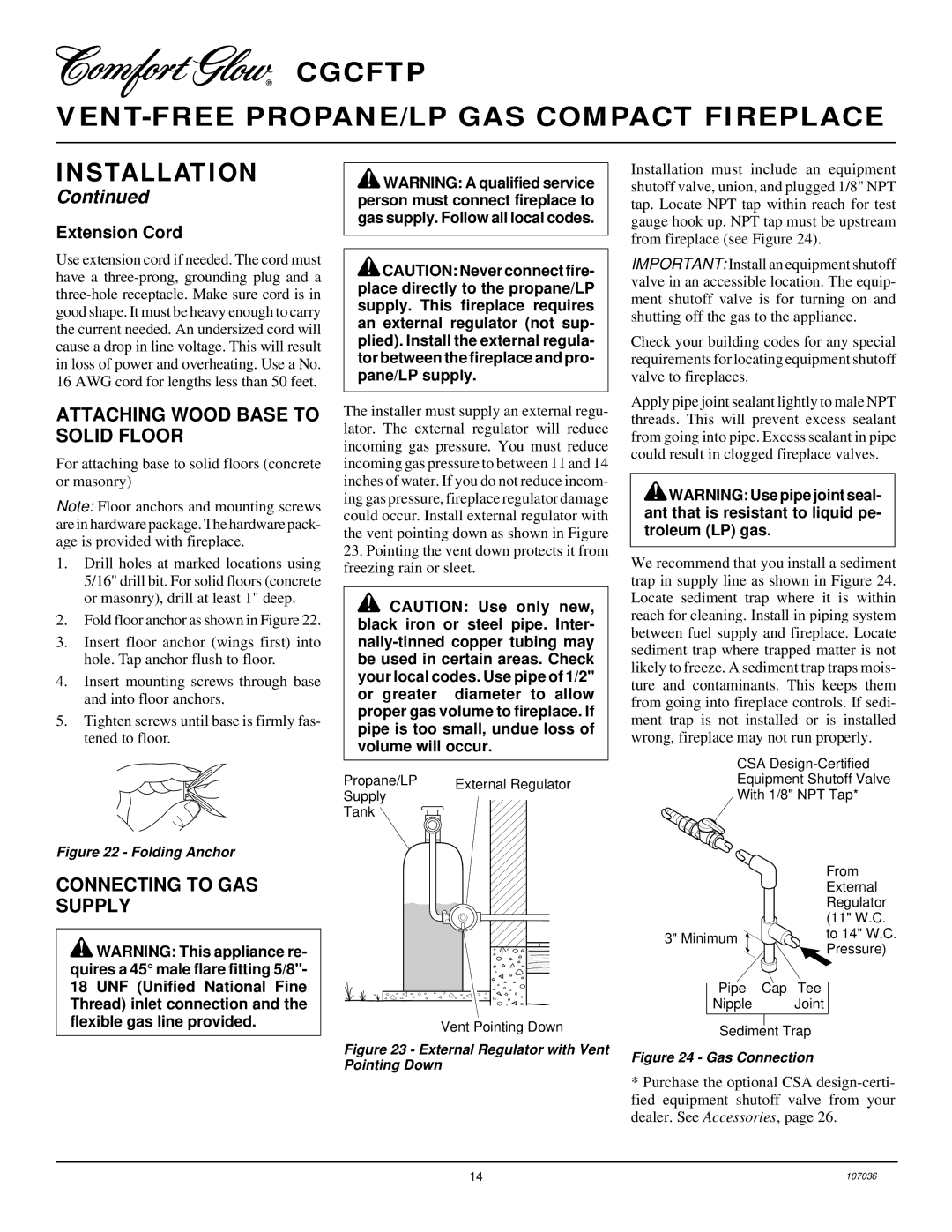
CGCFTP
INSTALLATION
Continued
Extension Cord
Use extension cord if needed. The cord must have a
ATTACHING WOOD BASE TO SOLID FLOOR
For attaching base to solid floors (concrete or masonry)
Note: Floor anchors and mounting screws are in hardware package. The hardware pack- age is provided with fireplace.
1.Drill holes at marked locations using 5/16" drill bit. For solid floors (concrete or masonry), drill at least 1" deep.
2.Fold floor anchor as shown in Figure 22.
3.Insert floor anchor (wings first) into hole. Tap anchor flush to floor.
4.Insert mounting screws through base and into floor anchors.
5.Tighten screws until base is firmly fas- tened to floor.
Figure 22 - Folding Anchor
CONNECTING TO GAS SUPPLY
![]() WARNING: This appliance re- quires a 45° male flare fitting 5/8"- 18 UNF (Unified National Fine Thread) inlet connection and the flexible gas line provided.
WARNING: This appliance re- quires a 45° male flare fitting 5/8"- 18 UNF (Unified National Fine Thread) inlet connection and the flexible gas line provided.
![]() WARNING: A qualified service person must connect fireplace to gas supply. Follow all local codes.
WARNING: A qualified service person must connect fireplace to gas supply. Follow all local codes.
![]() CAUTION: Never connect fire- place directly to the propane/LP supply. This fireplace requires an external regulator (not sup- plied). Install the external regula- tor between the fireplace and pro- pane/LP supply.
CAUTION: Never connect fire- place directly to the propane/LP supply. This fireplace requires an external regulator (not sup- plied). Install the external regula- tor between the fireplace and pro- pane/LP supply.
The installer must supply an external regu- lator. The external regulator will reduce incoming gas pressure. You must reduce incoming gas pressure to between 11 and 14 inches of water. If you do not reduce incom- ing gas pressure, fireplace regulator damage could occur. Install external regulator with the vent pointing down as shown in Figure
23.Pointing the vent down protects it from freezing rain or sleet.
![]() CAUTION: Use only new, black iron or steel pipe. Inter-
CAUTION: Use only new, black iron or steel pipe. Inter-
Propane/LP | External Regulator |
Supply |
|
Tank |
|
Vent Pointing Down
Figure 23 - External Regulator with Vent Pointing Down
Installation must include an equipment shutoff valve, union, and plugged 1/8" NPT tap. Locate NPT tap within reach for test gauge hook up. NPT tap must be upstream from fireplace (see Figure 24).
IMPORTANT: Install an equipment shutoff valve in an accessible location. The equip- ment shutoff valve is for turning on and shutting off the gas to the appliance.
Check your building codes for any special requirements for locating equipment shutoff valve to fireplaces.
Apply pipe joint sealant lightly to male NPT threads. This will prevent excess sealant from going into pipe. Excess sealant in pipe could result in clogged fireplace valves.
![]() WARNING: Use pipe joint seal- ant that is resistant to liquid pe- troleum (LP) gas.
WARNING: Use pipe joint seal- ant that is resistant to liquid pe- troleum (LP) gas.
We recommend that you install a sediment trap in supply line as shown in Figure 24. Locate sediment trap where it is within reach for cleaning. Install in piping system between fuel supply and fireplace. Locate sediment trap where trapped matter is not likely to freeze. A sediment trap traps mois- ture and contaminants. This keeps them from going into fireplace controls. If sedi- ment trap is not installed or is installed wrong, fireplace may not run properly.
CSA
Equipment Shutoff Valve
With 1/8" NPT Tap*
From External Regulator (11" W.C.
3" Minimum ![]() to 14" W.C. Pressure)
to 14" W.C. Pressure)
Pipe Cap Tee
Nipple Joint
Sediment Trap
Figure 24 - Gas Connection
*Purchase the optional CSA
14 | 107036 |
